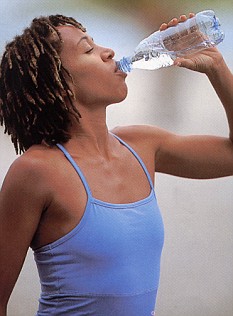We all heard the claims from the medical community about the benefits of drinking water, but most of them are aimed at maintaining a healthy complexion or improving bodily functions. While many nutritionists encourage more water consumption, it is not a hard and fast rule for weight loss – or is it?
The truth is that drinking water before a meal can help you feel full, which means you eat less. Without adding any additional calories to your diet, water can fool the body into thinking it has already been fed. This may explain why so many health enthusiasts drink water throughout the work day, and not just when they are thirsty. Water has a way of satisfyin g the body’s most natural craving – hydration. In fact, dietitians believe that many people mistake thirst for hunger. If you tend to eat in between meals, you could be thinking you are hungry, but in reality you only need water.
g the body’s most natural craving – hydration. In fact, dietitians believe that many people mistake thirst for hunger. If you tend to eat in between meals, you could be thinking you are hungry, but in reality you only need water.
According to nutritionists and doctors, drinking more water each day can help you slim down. Try keeping water bottles at your desk at work, in your refrigerator and in your car. When water is the first thing you see, it will soon become a habit. Instead of reaching for a can of soda, you will be more inclined to grab an ice cold bottle of water.
Calorie Reduction
As complicated as it may sound, weight loss is a simple matter of consuming fewer calories than you burn off through exercise. When you drink water before eating, it helps you consume fewer calories during a meal because when your stomach is full you are less inclined to clear your plate. This was proven in 2008 in a study by the Journal of the American Dietetic Association, which concluded that drinking a few classes of water about 20 minutes before eating will reduce your calorie intake by as much as 75 calories. While this might not seem like much, just drinking water before lunch and dinner each day could reduce your caloric intake by 150 calories a day, resulting in more than 14 pounds of weight lost in a year.
Waste Removal
Water is so essential to healthy bodily functions; it is an essential element of waste removal. Not only does it make you feel hydrated, water also flushes toxins from the liver might be holding onto. Think about it. The liver produces bile, which breaks down fat, but when the liver is clogged with toxins it isn’t functioning at peak capacity. Drinking water helps to release these toxins, thereby helping vital organs more efficient. In addition, if you don’t drink enough water you will become constipated, forcing excess fecal matter to stay in your body longer. People who suffer from constipation should increase water consumption as well as a minimum of 14 grams of fiber for every 1,000 calories. Keep in mind, however, that fiber cannot function effectively without water, so if you plan to increase fiber intake you must also add more water to your diet.
Water is calorie-free
Losing a pound of body weight requires a deficit of 3,500 calories, which may seem like a tall order. Few people realize that liquid calories count just as much as the calories from food, so when you switch to water consumption you are also eliminating those liquid calories. Consider this: a 16-ounce latte contains as much as 275 calories and a 20-ounce non-diet soda contains about 225 calories. Even sweetened iced tea will at 180 calories. But by choosing water you could cut approximately 670 calories from your daily diet. This alone would result in 2 ½ pounds of weight loss in a single week.
How much water is enough?
According to the MayoClinic.com, women need 9 cups of water each day and men need 13 cups. In situations of extreme heat or intense physical activity, fluid intake must be higher than that. Depending on your activity level, excessive perspiration will require an additional 1 ½ to 2 ½ cups of water each day, and remember, by the time you feel thirsty you are already experiencing mild dehydration. For this reason, it is important to drink water every 20 or 30 minutes while exercising.
